New strategies needed to control IBD in poultry

Controlling Infectious Bursal Disease virus (IBDv) is key for the future stability of the global poultry industry, according to UK researchers.
Scientists from Keele University say new strategies are needed to control the IBDv, which can severely damage the immune system of chickens. The warning comes in a paper published in the journal Virology, which looks at how IBDv is circulating among British poultry farms.
IBDv damages chickens’ immune systems by weakening their ability to resist infections and respond to vaccines, so controlling it is crucial for both animal welfare and food security.
IBDv-positive bursal samples
As part of ongoing epidemiological surveillance for IBDv, the hypervariable region of the VP2 capsid gene encoded by segment A, and a region of the VP1 polymerase gene, encoded by segment B, were sequenced from 20 IBDv-positive bursal samples obtained in 2020 and 2021 from 16 commercial British broiler farms.
Birds had received a live IBDv vaccine at 17-22 days and samples were taken at 25-55 days. Of the 16 farms, none contained the very virulent (vv) strains, 1 contained a classical virulent strain, 2 contained vaccine strains and 5 contained sequences of reassortant strains with a vv segment A and a non-vv segment belonging to genogroup A3B1.
In 8 of the farms, the researchers identified the sequences of both genogroup A3B1 reassortant strains and vaccine strains in the same samples. Therefore, the majority of the farms (13/16, or 81%) contained genogroup A3B1 reassortant viruses.
The IBDv is changing and adapting
The A3B1 has emerged throughout the globe in recent years, adapting through unique genetic variations and spreading across Europe, Asia and Africa. The study shows that the majority of sampled farms exhibited co-infection with vaccine strains, underscoring the possibility of the virus adapting and changing into new forms in the field.
“This work underscores the need for a multifaceted approach to IBDv control, incorporating genomic surveillance, vaccine efficiency studies and immunological assessments to understand the impact of viral reassortment and antigenic drift on disease presentation and immune escape,” said Dr Vishi Reddy from Keele University’s School of Life Sciences. “This study paves the way for broader analyses using whole-genome sequencing to deepen our understanding of IBDv’s evolving landscape and improve disease control strategies in poultry,” he added.










